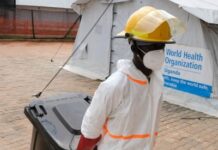Signed in 2018 to end years of conflict, the Revitalized Peace Agreement, initially set a three-year timeline for elections and the formation of a democratic government. The transition has been extended four times, with key political, security, and governance benchmarks remaining unfulfilled.
Nicholas Haysom, Special Representative of the Secretary-General briefing the Security Council on the situation in South Sudan.
Humanitarian crisis
More than one million Sudanese refugees have fled into South Sudan during the reporting period, joining an already staggering 9.3 million people in need of humanitarian assistance.
The country’s economic crisis is also worsening, with inflation soaring to 107 percent and food prices doubling, while government employees have not been paid for 10 months.
Health conditions are also deteriorating, with over 23,000 reported cholera cases exacerbated by last year’s floods. The disease continues to spread, particularly in remote areas with limited healthcare access.
The 2025 Humanitarian Needs and Response Plan aims to reach 5.4 million people with life-saving assistance and protection, but funding remains a critical challenge. The UN is appealing for $1.7 billion to meet urgent needs this year.
UNMISS operational constraints
Mr. Haysom, who also leads the UN peacekeeping mission in the country, UNMISS, briefed on logistical challenges faced after the Government requested the mission vacate part of its headquarters within 45 days.
He described the demand as imposing “significant costs” and logistical hurdles that UNMISS is not currently equipped to manage.
Restrictions on peacekeeper movement in some areas also continue to limit the mission’s ability to provide security and humanitarian support.
Steadfast support
Concluding his briefing, Mr. Haysom reaffirmed the UN’s commitment to standing “shoulder-to-shoulder” with the people of South Sudan on their path to stabilisation and democratisation.





























